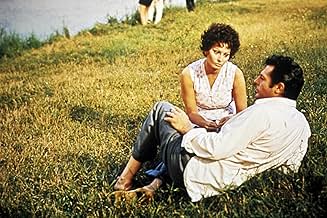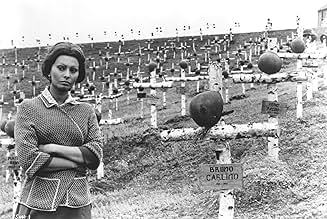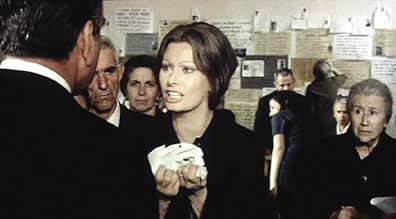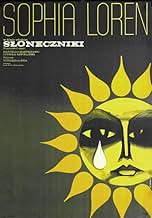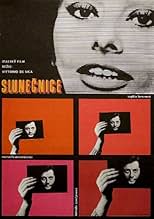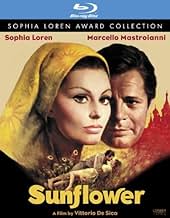An Italian woman conducts a desperate search for her husband, a soldier considered missing in action in Russia during WWII.An Italian woman conducts a desperate search for her husband, a soldier considered missing in action in Russia during WWII.An Italian woman conducts a desperate search for her husband, a soldier considered missing in action in Russia during WWII.
- Director
- Writers
- Stars
- Nominated for 1 Oscar
- 1 win & 2 nominations total
Lyudmila Saveleva
- Mascia
- (as Ljudmila Saveljeva)
Nadya Serednichenko
- Contadina russa
- (as Nadja Cerednicenko)
Gunars Cilinskis
- Funzionario russo
- (as Gunnar Zilinskij)
Carlo Ponti Jr.
- Giovanna's Baby
- (uncredited)
Mariya Sapozhnikova
- Passerby
- (uncredited)
- Director
- Writers
- All cast & crew
- Production, box office & more at IMDbPro
7.34.9K
1
2
3
4
5
6
7
8
9
10
Featured reviews
The Umbrellas of Cherbourg, Italian Style
I just finished watching the stunning Blu Ray of the original Italian English-subtitled version of this film--the best version available. I do not understand all the naysayers reviewing this film. If you are a fan of Loren and Mastroianni, if you are a fan of DeSica, if you enjoy a good old-fashioned melodrama that will tear at your heart, you MUST see this film! To dismiss this film as Soviet propaganda, or as unrealistic, is like criticizing "The Little Mermaid" for having a singing mermaid and talking fish. It utterly misses the point. This movie contains one of the very best, if not THE best Sophia Loren performance on film. Henri Mancini's score is unforgettable. This film makes you care about the plight of both characters. It is available as part of the new "Sophia Loren Collection" box set, and for me, this, along with "Marriage Italian Style," is the "jewel" of the set. See it!
Sofia Loren and Marcello Mastroianni outstanding in a classic love story with ravishing photography
Epic romantic melodrama , set at the end of World War II , dealing with an Italian woman , Giovanna, she is a bereft war bride living near Milan , she conducts a desperate search for her husband, a soldier considered missing in action in Russia during WWII. As her husband never returned after serving on the Russian front . As Giovanna wandering over what feels like the whole of Russia and looking for clues her hubby. A woman born for love. A man born to love her. A timeless moment in a world gone mad. In a world gone mad...a love story. Filmed in Russia from the Kremlin to the Ukraine. A love story that spans two tempestuous decades in a motion picture of extraordinary power and enchantment!
Excruciating drama in which Sophia Loren plays a headstrong Italian wife looking for hubby , going to Russia to find him, starting in the town near the winter battle when he disappeared and much picturesque and soul-searching later she finds him with unexpected consequences . It is a heart-rending and heart-breaking studio of a beloved couple sadly separated by an unfortunate fate . There's a flashback to their brief courtship near her hometown of Naples, his 12-day leave to marry her, and ruses to keep from deploymentby posing as a nutty man . Sofia Loren gives a nice acting as the obstinate woman who refuses to accept that her husband missing on the Russian front, is dead. While Marcello mastroianni is perfect as the amnesic man missing in battle . The Technicolor cinematography by Giuseppe Rotunno and David Vinitsi is truly gorgeous. Shot on location in Russia and infact , this film is deemed to be the first occidental film to be shot in Poltava, Ukraine .And positively soaked in one of Henri Mancini's lushest soudtracks.
The motion picture produced by Carlo Ponti and Joseph H Levine , was stunningly directed by Vittorio de Sica . De Sica told about Loren : ¨I consider Sophia a great , a good actress and a great personality. Because she is a Neopolitan. Like me. We are the same people, the same origin. And we feel together the same. Yes, for me, I am very happy when I work with Sophia¨. De Sica was a famous actor and director .He turned to filmmaking in 1940 , making light comedies. His fifth movie collaborated with writer Cesare Zavattini , I Bambi ni ci guardano ,in which showed great sensitivity and nice fIl making . It was also the first movie he made with writer Zavattini with whom he would subsequently shoot "Shoeshine" , and Bicycle thief .After the boxoffice disaster "Umberto D" , he abandoned the Neorrealist genre to make more commercial films than previous . Subsequently , he he made "Yesterday , Today and Tomorrow" with Marcelo Mastroiani and Sofia Loren in which he won another Oscar . His two final films were Garden of Finzi Contini and A brief vacation that had limited success .Rating 7/10 . Worthwhile watching . Above average . Essential and indispensable seeing for Italian films buffs .
Excruciating drama in which Sophia Loren plays a headstrong Italian wife looking for hubby , going to Russia to find him, starting in the town near the winter battle when he disappeared and much picturesque and soul-searching later she finds him with unexpected consequences . It is a heart-rending and heart-breaking studio of a beloved couple sadly separated by an unfortunate fate . There's a flashback to their brief courtship near her hometown of Naples, his 12-day leave to marry her, and ruses to keep from deploymentby posing as a nutty man . Sofia Loren gives a nice acting as the obstinate woman who refuses to accept that her husband missing on the Russian front, is dead. While Marcello mastroianni is perfect as the amnesic man missing in battle . The Technicolor cinematography by Giuseppe Rotunno and David Vinitsi is truly gorgeous. Shot on location in Russia and infact , this film is deemed to be the first occidental film to be shot in Poltava, Ukraine .And positively soaked in one of Henri Mancini's lushest soudtracks.
The motion picture produced by Carlo Ponti and Joseph H Levine , was stunningly directed by Vittorio de Sica . De Sica told about Loren : ¨I consider Sophia a great , a good actress and a great personality. Because she is a Neopolitan. Like me. We are the same people, the same origin. And we feel together the same. Yes, for me, I am very happy when I work with Sophia¨. De Sica was a famous actor and director .He turned to filmmaking in 1940 , making light comedies. His fifth movie collaborated with writer Cesare Zavattini , I Bambi ni ci guardano ,in which showed great sensitivity and nice fIl making . It was also the first movie he made with writer Zavattini with whom he would subsequently shoot "Shoeshine" , and Bicycle thief .After the boxoffice disaster "Umberto D" , he abandoned the Neorrealist genre to make more commercial films than previous . Subsequently , he he made "Yesterday , Today and Tomorrow" with Marcelo Mastroiani and Sofia Loren in which he won another Oscar . His two final films were Garden of Finzi Contini and A brief vacation that had limited success .Rating 7/10 . Worthwhile watching . Above average . Essential and indispensable seeing for Italian films buffs .
Love, Hope, Truth and Renounce
In Naples, in World War II, the local Giovanna (Sophia Loren) has a torrid love affair with the soldier Antonio (Marcello Mastroianni), who is ready to embark to Africa. Giovanna proposes him to get married with her to get a leave of twelve days; then Antonio pretends that he is insane and he is sent to an asylum. However, the doctors discover the farce and they give the option to Antonio to go to the Russian front as volunteer instead of being sued. When Antonio is missing in action in Russia, Giovanna does not accept that he is dead. Years after the end of the war, Giovanna travels to Russia with a picture of Antonio to seek him out in the countryside. When she finds a lead in a village, her hope becomes disappointment with truth about his disappearance.
"I Girasoli" is one of the most famous romances of cinema and discloses a beautiful story of love, hope, truth and renounce. Vittorio De Sica explores the chemistry between Sophia Loren and Marcello Mastroianni to the best, supported by a magnificent cinematography and the wonderful soundtrack of Henry Mancini, which certainly is among the most beautiful ones of the cinema history. The screenplay uses much ellipsis, and my remarks are the lack of dates, leaving the viewer without any reference of how many years have passed; further, the dialogs in Russian that are not translated. My vote is eight.
Title (Brazil): "Os Girassóis da Rússia" ("The Russia's Sunflowers")
"I Girasoli" is one of the most famous romances of cinema and discloses a beautiful story of love, hope, truth and renounce. Vittorio De Sica explores the chemistry between Sophia Loren and Marcello Mastroianni to the best, supported by a magnificent cinematography and the wonderful soundtrack of Henry Mancini, which certainly is among the most beautiful ones of the cinema history. The screenplay uses much ellipsis, and my remarks are the lack of dates, leaving the viewer without any reference of how many years have passed; further, the dialogs in Russian that are not translated. My vote is eight.
Title (Brazil): "Os Girassóis da Rússia" ("The Russia's Sunflowers")
Two Characters to share the same sense of loss.
I suppose this film is just a maudlin melodrama, so is the music by Mancini. But then..., what a marvelous maudlin melodrama!... Why shouldn't it be? what's wrong with maudlin melodramas? If they are well done and authentic with their characters, if we get wrapped up with their emotions..., well, can you ask for anything more?
I just saw this movie on "You Tube" for the second time. I remember seen it on late TV in Italy, many years ago, and the impression was so powerful that after somebody mentioned it a few days ago --I didn't remember any more this title until they mentioned it-- I decided to look for it and watch it again, to see after so many years if the impression was still the same (so many films are a total disappointment when seen for a second time years later), but it wasn't the case with this one.
The story is so poignant that it can hold on its own very well no matter the change in mores and film technical improvements, it definitely grabs your interest till the very end (I must admit the film is far from perfect, since, for example, there are no indications of how many years went by or the new life style Sophia's character turns to after her Russian trip.
It also has two climaxes, both marvelous, but I think they should have decided for one or the other, two climaxes is too much within the same movie, and the length should have been shortened quite a bit.
Anyhow, forget about the lachrymose side of the story and submerge yourself in it (also get some Kleenex handy because everybody will need them, and plenty) and if you have to have a good cry, well, have it and enjoy it!! (After all is just a movie).
I just saw this movie on "You Tube" for the second time. I remember seen it on late TV in Italy, many years ago, and the impression was so powerful that after somebody mentioned it a few days ago --I didn't remember any more this title until they mentioned it-- I decided to look for it and watch it again, to see after so many years if the impression was still the same (so many films are a total disappointment when seen for a second time years later), but it wasn't the case with this one.
The story is so poignant that it can hold on its own very well no matter the change in mores and film technical improvements, it definitely grabs your interest till the very end (I must admit the film is far from perfect, since, for example, there are no indications of how many years went by or the new life style Sophia's character turns to after her Russian trip.
It also has two climaxes, both marvelous, but I think they should have decided for one or the other, two climaxes is too much within the same movie, and the length should have been shortened quite a bit.
Anyhow, forget about the lachrymose side of the story and submerge yourself in it (also get some Kleenex handy because everybody will need them, and plenty) and if you have to have a good cry, well, have it and enjoy it!! (After all is just a movie).
cold war pro soviet fantasy
As another reviewer pointed out this bit of cold war propaganda (pro Soviet) was absurdly impossible. An axis soldier would have been shot period or arrested as a spy and killed slowly in a prison camp.
So you have to dismiss the story as absurd as it stands and place it in Iran or Finland or some place where it could have happened. Or just suspend your disbelief.
Once you do that you can enjoy this bit of really well done maudlin romance. Loren had to be at the height of her classy beauty in this film (before she was aged for the story).
I loved the part where she spots an Italian man---the only handsome well dressed stylish man in any of the Russian scenes. Of course Loren herself is like a super nova star compared to the kerchiefed thick legged Russian women. Italian audiences must have loved this film.
I give it a 7 as it is very enjoyable once you deal with the absurd story and the maudlin nature of the movie. As another reviewer states what is so wrong with first class maudlin??
So you have to dismiss the story as absurd as it stands and place it in Iran or Finland or some place where it could have happened. Or just suspend your disbelief.
Once you do that you can enjoy this bit of really well done maudlin romance. Loren had to be at the height of her classy beauty in this film (before she was aged for the story).
I loved the part where she spots an Italian man---the only handsome well dressed stylish man in any of the Russian scenes. Of course Loren herself is like a super nova star compared to the kerchiefed thick legged Russian women. Italian audiences must have loved this film.
I give it a 7 as it is very enjoyable once you deal with the absurd story and the maudlin nature of the movie. As another reviewer states what is so wrong with first class maudlin??
Did you know
- TriviaThe child of Giovanna (Sophia Loren) in this film was actually Loren's from her partnership with producer Carlo Ponti.
- GoofsMascia tells Giovanna that when she found Antonio, he was hurt so badly that he had forgotten everything, including his own name. If that's true, then how did Mascia know his name was Antonio?
- ConnectionsEdited into Marcello, una vita dolce (2006)
- How long is Sunflower?Powered by Alexa
Details
- Release date
- Countries of origin
- Languages
- Also known as
- Suncokreti
- Filming locations
- Production companies
- See more company credits at IMDbPro
- Runtime
- 1h 47m(107 min)
- Sound mix
- Aspect ratio
- 1.85 : 1
Contribute to this page
Suggest an edit or add missing content


